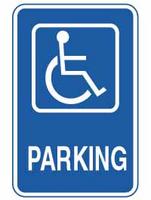
I've had a disabled parking permit for several months now. Initially, I asked my doctor about getting one because I'd had some trouble with distant parking spaces at places like the supermarket and Target. Getting to the store wasn't usually any trouble, but getting back to the car was: after wandering around the grocery store for an hour and a half trying to find where they hide the rice cakes, I'd be plenty tuckered out, especially in the summer months.
I made increasing use of my cripple tags (
can I call them that? please? the phrase really just rolls off the tongue) over the summer. I also started making occasional use of a cane. Well, actually, it's just a 3-foot length of dowel my father-in-law had used to prop up the tail gate on his old minivan after it stopped staying up on its own. At first, I was pretty shy about it, but I've gotten a little more comfortable with it.
Up until recently, I'd been paying $100 a month to park in the parking ramp under the building where my office is located. I work downtown, and parking is awful; everyone who works downtown has to pay for a parking space (unless their employer pays for one, which mine does not). The ramp is pretty convenient, and although it has precious few designated spaces for the disabled, it was never very difficult to get a space that was within 100 feet of an elevator to the main floor.
There are a number of metered parking spaces conveniently located in front of my building. Where I live, if you've got a cripple tag (
please?), you can park free in a metered spot for as long as you want (as long as it's more than a 30-minute meter). This past month, I gave up my paid parking space, and started parking out front with my cripple tag. By doing so, I've effectively given myself a raise of about $1,000 a year.
Am I a bad person? Consider:
1. I can afford $1,000 a year for parking, though it's definitely not chump change to me (hey, I'm a guy who washes and reuses ziplock bags).
2. The city, in compliance with state law, is essentially subsidizing my parking.
3. I notice that I'm not the only person who uses the metered spaces out front in this way.
4. If I could park in the ramp for free, I would (it's warm and dry), so it's not that I really prefer parking at the meter, I prefer parking at the meter
for free.
5. I've been carrying the cane every time I park with the cripple tags, not because I always need to use the cane, but because I feel like it authenticates my entitlement to park with the cripple tags. If I was parking in the ramp, I probably wouldn't carry the cane to work every day. Incidentally, I don't use the cane in the office, just getting into and out of it, and I mostly need it at the end of the day when I'm at my wobbliest.
technorati tag:
multiple sclerosis

